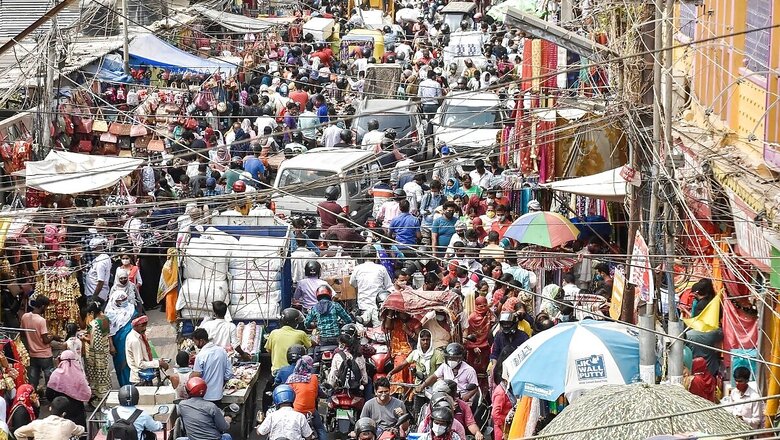
views
Namaste sada vatsale matribhoomi…
Thus begins the prayer of the Rashtriya Swayamsevak Sangh (RSS). A prayer that is sung at all its Shakhas since 1940. The first line itself is an invocation and commitment to the nation. The current elected first among equals of the RSS or its SarSanghchalak (head) Mohan Bhagwat underlining the social outfit’s commitment to the country yet again while speaking at a function of the Muslim Rashtriya Manch in Ghaziabad, the very city near Delhi where the Loni incident happened recently. A fake video of an old Muslim tantric being beaten up and forced to chant ‘Jai Shri Ram’ had surfaced in June.
Investigation unearthed a politically motivated plot to stir communal tension around what was a criminal act committed by members of the Muslim community against a Muslim tantric who failed to use his claimed powers to do the criminals’ bidding. This is another instance of ‘fear mongering’ which a few in our country have made a business of.
Mohan Bhagwat made the ‘One Nation One People’ pitch when he said we all have the same DNA as our ancestors are the same. He also was right in saying that for us the cow is sacred but lynching in the name of cow is not the Hindu way of life. Those who do so are not Hindus. They are criminals. Cow slaughter and cow smugglers should be punished by law and not by the lynch mob. There have been multiple reactions to Bhagwat’s statement across the political spectrum and many have tried to brush it off as mere eyewash. However, RSS baiters need to introspect. They need to go back to their own parent organisations and political parties and check how many of them invoke the Motherland in their prayers. They need to check when was the last time they made a pitch to unite Bharat and not divide it further amid caste and communal lines.
India was divided in 1947 on the grounds of religion; 35% of erstwhile Bharat was wrenched away to create a separate land for Muslims as Hindustan and Pakistan came into being. That Hindustan continued to retain its inclusive nature is a testament of our culture. That Pakistan continues to torment non-Muslims in the name of religion and Bangladesh (erstwhile East Pakistan) too has failed to protect minorities demonstrates the intolerance of the majority (Muslims) who reneged on their commitment to upholding secularism.
History must be remembered and reminded to those who espouse equal justice. It is a documented fact that in 1946 constituent assembly elections most of the Muslims across India backed the two-nation theory and voted for the Muslim League led by Jinnah over Abul Kalam Azad who from the Congress was advocating an undivided Bharat. The partition of India was demanded by Muslims in India on the grounds that they weren’t of the same origin as non-Muslims and that they wanted their own land. These were Muslims from the now Uttar Pradesh, Bihar, Madhya Pradesh, Telangana, Andhra Pradesh, etc. Many of them even embarked towards the promised land but were in for a rude shock when the Punjabi Muslims of the now Pakistan Punjab shunned them and drove them southward towards Sindh. Even after seven decades, descendants of this lot continue to be called ‘Muhajirs’ or immigrants. When they realised what was happening, many who had packed their bags, unpacked and stayed put. Slowly over the decades those that chimed about being different started saying, they are the same. But the seeds of separatism continue to be sown.
Jammu and Kashmir is a shining example. Why did the Muslims of Bharat allow a particular lot to rape, loot, lynch and drive away lakhs of non-Muslims from their homes in Kashmir? Where was the Bharatiyata? Those that claim to stand up for minority rights remained silent for decades as the rights of minorities in Jammu and Kashmir was brazenly trampled. They remained silent because they defined minorities as Muslims only. Tolerance is a two-way street. Respect cannot be one sided. The door of inclusion swings both ways. One group cannot say “include me in all that you have but stay out of what is mine”. It is perhaps only in India that the majority is made to feel apologetic about being in majority and is expected to over compensate and over accommodate the minorities. It is perhaps only in India that followers of Sanatan Pratha are denied their rights in Muslim-dominated states/Union Territories while Muslims despite being the second largest majority want quotas for themselves pan-India. It is a sad and telling commentary on the baiters of the Sangh that many within that lot are selectively vocal even about lynching. Lynching anyone is a crime. But Pehlu Khan is mourned while Savan Rathore who was burnt alive in Pune in Maharashtra in 2016 is forgotten. Akhlaq is remembered but Arun Mahor is forgotten, Junaid is remembered but Pankaj Narang is forgotten. Rakbar is remembered but Vishnu Kumar is forgotten. More than three dozen documented cases of Muslim atrocities on non-Muslims (a lot of them on Dalits) in the last three years itself and not one has made international headlines. This selectivity is communal.
Mohan Bhagwat and the RSS have put Bharat first. Will those that question him first commit to Bharat? Will they call a crime a crime and stop painting it with a communal hue? Will they stop the fear-mongering and admit that Bharat is the only country where every ideology, every religion and its sects find freedom at a level found in no other country in the world. Will they openly admit that Muslims are not a minority but the second largest majority in the country? Will they openly say that dividing our nation on communal lines was wrong? Will they pray like every Swayamsevak does for restoring Bharat to its pre-colonial glory? Will they openly say that they are tolerant towards all paths and beliefs and do not have a “superiority complex”?
Hindu is the way of life that defines the cultural ethos of Bharat. Sarva Dharma Sama Bhav and Sarv Jana Hitaay, Sarv Jana Sukhaay are integral to Bharat. RSS in its prayer calls for unity. It dreams of an undivided Bharat. Those that profess the cause of one particular community or pander to just one section of the society are in reality, communal. To work towards a strong, self-reliant, self-sufficient Bharat which is tough in its posture but ‘Vinamra’ in its demeanour is the Sangh dream. Do the “baiters” differ? Do they believe their DNA is different? I am not a Swayamsevak, have never been to a Shakha, but I see nothing wrong in what Mohan Bhagwat and the Sangh want for our nation. Ek Bharat, Shresta Bharat, Akhand Bharat.
Read all the Latest News, Breaking News and Coronavirus News here.




















Comments
0 comment